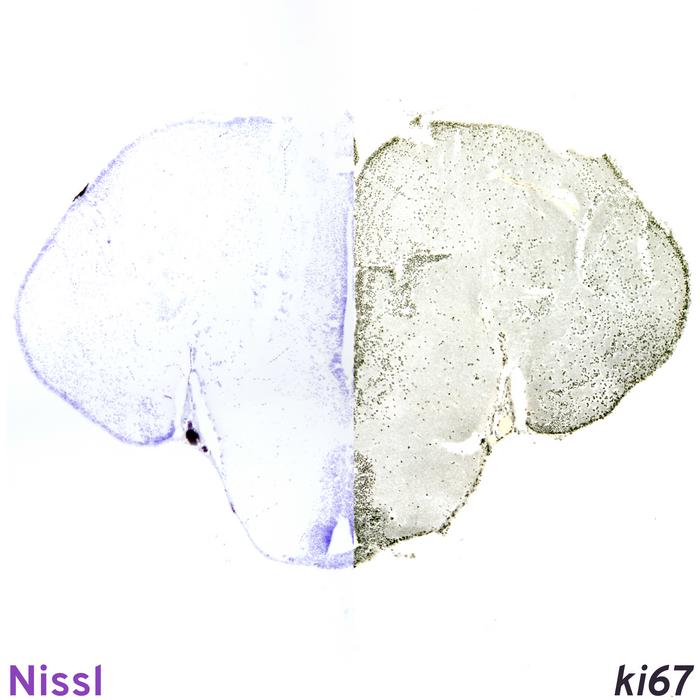New research reveals that pregnancy-related brain impairment is present in live-bearing fish, but instead of affecting learning and memory as expected from similar research on mammals, it appears to have a stronger impact on decision-making and sensory reception.

Credit: Tiffany Ernst
New research reveals that pregnancy-related brain impairment is present in live-bearing fish, but instead of affecting learning and memory as expected from similar research on mammals, it appears to have a stronger impact on decision-making and sensory reception.
There have been many studies into the detrimental impact of pregnancy on mammalian brains, sometimes called “baby brain” or “momnesia” in humans, revealing how the disruption of neurological processes like neurogenesis, or the creation of new neurons, can affect learning and memory – but this is the first study to examine this phenomenon in fish.
While most fish reproduce by laying eggs, some species are live-bearing, or viviparous, and carry their offspring internally before producing live young. Viviparous species include popular aquarium fish from the family Poeciliidae, such as guppy, molly and platy.
“We wanted to see if these pregnancy-related changes in cognition and neurogenesis occur in other live-bearing evolutionary lineages, particularly in a species which lacks a placenta,” says Tiffany Ernst, a PhD candidate in the field of developmental and reproductive biology at Wageningen University, Netherlands. “In mammals, the placenta is thought to help regulate pregnancy-related changes to the mother’s brain.”
“The species of fish that I work with, Poeciliopsis gracilis, is especially interesting as they are superfetatious, meaning they can be pregnant with multiple temporally overlapping broods of offspring simultaneously,” says Ms Ernst. “Essentially, my fish are almost constantly pregnant in adulthood – so any detrimental impact on cognition might be more evident in this species.”
“We hoped to learn how pregnancy might induce changes to the maternal brain in a non-mammalian live-bearing species,” says Ms Ernst. “This could help us to understand whether the evolution of a live-bearing reproductive strategy requires neurological trade-offs to adequately adapt for a healthy pregnancy.”
To examine the impact of pregnancy on cognition, pregnant and virgin fish were trained to associate a green disk with the location of food, and then perform a spatial learning task when presented with two seemingly identical disks in different locations. “Then we tested their cognitive flexibility by swapping the locations of the rewarded and non-rewarded disks to see how the fish adjusted to the new location of the food reward,” says Ms Ernst.
To assess the effect on fish neurology, Ms Ernst and the team removed the brains of the pregnant and virgin females and used cell staining to identify areas of new cell proliferation – an indicator of which areas of the brain were producing new cells. This study is the first to map the areas of brain cell proliferation in this species in a “brain atlas”.
Ms Ernst and her team found that while both pregnant and virgin fish were equally successful in both cognitive tasks, pregnant fish were much more hesitant when choosing which disk to approach.
“We also found no difference in cell proliferation in the regions of the brain most responsible for learning and memory,” says Ms Ernst. “However, we were surprised to see that pregnant females exhibited decreased cell proliferation in the regions which contribute to maternal olfactory reception.”
This surprising result suggests that pregnancy compromises the fish’s ability to interpret scent in the water, which may contribute to their choice-aversion in the cognitive tests. “For P. gracilis, reduced choice-propensity during pregnancy might be an adaptive strategy wherein females do not take the risk of foraging for food when the reward is not guaranteed, thus conserving energy for reproduction,” says Ms Ernst.
“Our research indicates that pregnancy may impact maternal cognition and alters brain cell proliferation, but not in the same ways as we would expect from mammals,” says Ms Ernst. “This implies that pregnancy across different evolutionary lineages has an impact on the maternal brain which in turn, affects how mothers cognitively and physiologically adapt to the burdens of live-bearing reproduction.”
This research is being presented at the Society for Experimental Biology Annual Conference in Prague on the 2-5 th July 2024.



